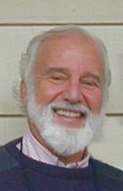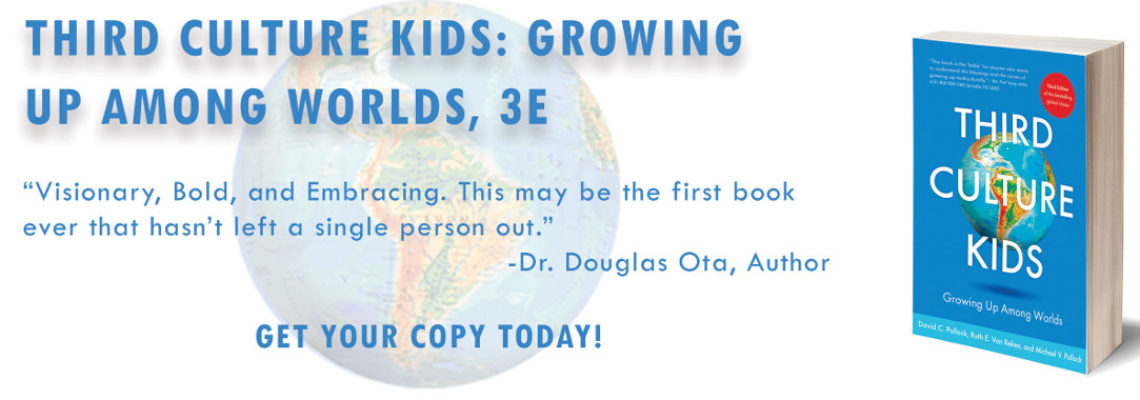In memory of David C. Pollock, A man ahead of his time: June 9, 1939 – April 11, 2004
 For many, many adult TCKs, our “aha!” moment when we realized we had a name came as we sat in Dave Pollock’s lecture on The TCK Profile or read one of his early articles about this topic. Although Ruth Useem, sociologist from Michigan State University, coined the term Third Culture Kids in 1960, Dave was the person who translated it from an academic idea to making a difference in the lives of those who were living it.
For many, many adult TCKs, our “aha!” moment when we realized we had a name came as we sat in Dave Pollock’s lecture on The TCK Profile or read one of his early articles about this topic. Although Ruth Useem, sociologist from Michigan State University, coined the term Third Culture Kids in 1960, Dave was the person who translated it from an academic idea to making a difference in the lives of those who were living it.
While living in Kenya near an international school in the 1970s, Dave heard many common themes from the students he interacted with from that school. In time Dave, a master synthesizer of distilling these recurring themes into easily accessible models, created his landmark TCK Profile and one of the first models of transition which he simply called The Transition Experience. When he returned to the States, Dave resumed leadership of an organization called Interaction, Inc. whose purpose was to help organizations sending families overseas to care for them well. He and Paul Nelson chaired the first international conference on matters related to TCKs in October, 1984 in Manila, Philippines.
Dave traveled endlessly to schools and organizations, including the UN, trying to create awareness of this growing phenomenon occurring in our globalizing world. Initially, he faced much skepticism both at the importance of dealing with issues of transition and identity development for global families, but also the question, “But it’s not that big a deal because not that many families are involved.” But Dave saw the big picture and where the world was headed. He persisted in not only raising awareness, but offering concrete strategies for how parents and organizations could help children grow strong in the context of a cross-cultural and highly mobile childhood.
From the early 1980s, Dave set up reentry camps each summer to help repatriating TCKs learn how to successfully navigate these often rough waters so they wouldn’t be caught in the unexpected rapids which sometimes swirled around. He saw early on that issues related to internationally mobile families was a global topic, not just a Western one. Dave worked diligently to help organizations from non-Western countries develop his signature “Flow of Care” for those they sent overseas and to think through the potential cultural changes their children might experience as they attended international schools rather than local schools. By the end of his life, Dave was also focusing his attention on refugee communities, understanding that in living outside of their original cultures these children faced many of the same challenges as traditional TCKs did.
When my friends and I had the idea of organizing the first Families in Global Transition (FIGT) conference in 1998, I called Dave to see if he would be willing to come and help us launch our dream. With less than eight weeks notice, he agreed and because he came, attendees came from many places to hear him and FIGT became reality. Dave was the plenary speaker for the first two conferences and did workshops for us regularly after that.
In the end, Dave literally gave his life in and for the worldwide community he served so well. In 2004, although he did not feel well, Dave embarked on what was to be one more tour through Europe, Africa, and Asia. In one of his first stops in Vienna, he went from the stage at the American School to a local hospital where he was diagnosed with pancreatitis from a blocked bile duct. They performed surgery that night to remove the offending gallstone but the next morning he had a cardiac arrest and died 9 days later on Easter Sunday.
The loss of such a thought-leader in our community staggered me. How would we all go on when he was such a strong, passionate, and visible advocate? Soon after I received the news that his death was imminent, however, I attended a Good Friday service and pondered in the silent darkness the great “But why?” question. “Why Dave? Why now?” And then the verse came to mind from John 12:24, “Very truly I tell you, unless a kernel of wheat falls to the ground and dies, it remains only a single seed. But if it dies, it produces many seeds.” I saw then that there were countless people all over the world in whose lives Dave had planted many seeds. Even though the one who had led and mentored so many of us was soon to be gone, all those seeds now scattered globally would take root and grow in new places. The topic had become too big for anyone person to carry alone. We all had to do our part.
And so it has been. FIGT is one of those trees that has grown from the seeds Dave Pollock planted in not only me, but in so many who have been instrumental in helping it grow. All who have ever attended or gained from this organization are in a real sense tasting the fruit from one of the trees he helped to plant in this world. It is right that on the tenth anniversary of his death, we stop and give thanks as we remember a truly great man who shared his pastoral heart with the world. Many of us will never be the same because of him. Thank you, David Pollock. I’m sorry you aren’t here to see what so many seeds you planted have become. And thanks to you, Betty Lou, and your family for sharing him with us and today we recognize your personal loss of husband, father, and grandfather as well as our communal loss. I am grateful the FIGT Board established a David C. Pollock Scholarship Fund in his honor and memory so that his contributions remain fresh in our minds – as they should.
